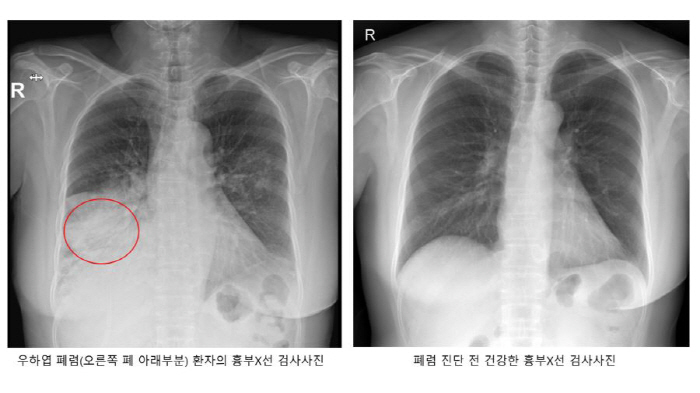Pneumonia, which is similar to a cold, is dangerous if your lips turn blue
Feb 25, 2025
|
According to the Vatican on the 24th (local time), the pope did not show asthma or shortness of breath, and some blood test levels improved.
He also said that the symptoms of kidney failure, which were feared to have complications, were not particularly worrisome.
Pneumonia is a disease in which bacteria or viruses penetrate the lungs and become inflamed. Bacterial pneumonia caused by pneumococcus is common. Pneumococci usually reside on the mucous membranes of the nose and throat. When our body's immunity weakens, it penetrates the lungs, brain, blood vessels, and ears, causing pneumonia and meningitis.
Patients with the flu or cold are secondary to bacterial pneumonia.
Min Jin-soo, a professor of respiratory medicine at the Catholic University of Korea's Seoul St. Mary's Hospital, explained in this regard that the bronchial tubes and lung mucosa are damaged by the virus, which weakens the defense of the lungs and easily penetrates the pneumococcus through the gap.
The initial symptoms of pneumonia are similar to those of common colds such as fever, cough, and phlegm. However, when pneumococcus begins its full-fledged activity, it causes high fever, cough, chest pain, and shortness of breath. When you are short of breath, your breathing rate increases, which is characterized by more than 20 times per minute.
In the case of pneumonia caused by pneumococcus, the color of the sputum may change to reddish-brown.
Professor Min Jin-soo said "When the lungs are damaged by pneumonia, the oxygen exchange function decreases, resulting in a drop in oxygen levels in the blood. As a result of this, 'blueness', which turns the lips blue, is a symptom of pneumonia complications. This can be life-threatening, so you must visit a hospital."
Healthy adults can easily get better with antibiotic treatment and moderate rest. However, because the elderly have a significant drop in lung function and immunity, once they have pneumonia, they often lead to severe cases. Pneumonia progresses severely, leading to respiratory failure and receiving ventilator treatment in the intensive care unit, or blood pressure drops due to sepsis, leading to fatal shock. Multiple organ failure can be life-threatening. Therefore, pneumococcal vaccination for the elderly with relatively low immunity is more important, and for those over 65 years of age, one dose can be given without any cost due to the national vaccination project.
Professor Min Jin-soo "Like other infectious diseases, it is treated with antibiotics, but treatment is becoming increasingly difficult as more people are infected with bacteria resistant to existing antibiotics. Therefore, it is important to prevent pneumonia in advance through pneumococcal vaccination."
|
This article was translated by Naver AI translator.















